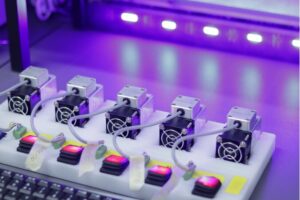
Technological advancements have become the norm, it is imperative to empower the younger generation with the skills and knowledge they need to succeed. One such empowering tool that has captured the attention of educators, parents, and industry professionals alike is CNC machining. The fusion of computer numerical control (CNC) technology with traditional machining techniques has unlocked a world of possibilities, allowing young minds to explore, create, and innovate like never before. Young adults can already check online CNC Machining quote to have a better idea.
The Rise of CNC Machining
CNC machining has revolutionized the manufacturing industry, replacing manual operations with automated precision. This cutting-edge technology utilizes computer-aided design (CAD) software to generate intricate designs, which are then translated into machine instructions through specialized programming. The result? The ability to fabricate complex and precise components with incredible efficiency.
A Gateway to STEM Education
STEM (Science, Technology, Engineering, and Mathematics) education has gained significant traction in recent years, emphasizing the importance of these subjects in preparing students for the future job market. CNC machining serves as an invaluable gateway to STEM education, providing hands-on experience and fostering critical thinking skills.
By integrating CNC machining into educational curricula, students are exposed to real-world applications of math, physics, and engineering principles. They learn how to design prototypes, program machines, troubleshoot issues, and optimize production processes. Through these immersive experiences, young minds develop problem-solving abilities, logical reasoning, and a deep understanding of the practical applications of STEM concepts.
Nurturing Creativity and Innovation
Creativity and innovation are the driving forces behind progress and success in any field. CNC machining acts as a catalyst for nurturing these essential traits among young minds. With the freedom to bring their ideas to life, students can transform their imagination into tangible prototypes.
The design possibilities offered by CNC machining are limitless. Intricate shapes, complex geometries, and detailed engravings can be effortlessly realized with the precision and accuracy of these machines. By experimenting with different materials and exploring various design iterations, students gain a profound appreciation for the iterative nature of the design process. They learn to embrace failures as stepping stones to improvement and develop resilience in the face of challenges.
Bridging the Gap between Academia and Industry
One of the greatest benefits of introducing CNC machining in educational settings is the seamless transition it offers from the classroom to the industry. By gaining proficiency in CNC programming and operation at a young age, students acquire highly sought-after skills that are in high demand in the job market.
Employers across industries, from aerospace to automotive, are increasingly relying on CNC machining to streamline their production processes. By familiarizing students with this technology, educational institutions are equipping them with a competitive advantage. Graduates who possess practical knowledge of CNC machining can seamlessly integrate into the workforce, making them highly desirable candidates for employers.
Empowering Entrepreneurship and Small-Scale Manufacturing
In addition to preparing students for traditional employment opportunities, CNC machining also serves as a gateway to entrepreneurship and small-scale manufacturing. The accessibility and affordability of desktop CNC machines have empowered young minds to turn their ideas into marketable products.
With the ability to prototype and manufacture in-house, budding entrepreneurs can refine their designs, test their concepts, and bring their products to market with greater speed and efficiency. This democratization of manufacturing has eliminated many of the barriers that previously hindered aspiring innovators, opening doors to new possibilities and fueling economic growth.
The Future of CNC Machining and Education
As CNC machining continues to evolve and become more accessible, its impact on education and young minds will only grow stronger. The integration of advanced technologies like 3D printing and artificial intelligence will further expand the capabilities of CNC machines, unlocking even greater potential for creativity and innovation.
You might also want to read about Promoting Teenage Health: Harnessing the Benefits of Shade Cloth for Well-being.
Educational institutions must recognize the significance of incorporating CNC machining into their programs to prepare students for the challenges and opportunities of the future. By doing so, they empower young minds to become the architects of progress, ready to shape a world where imagination knows no bounds.
